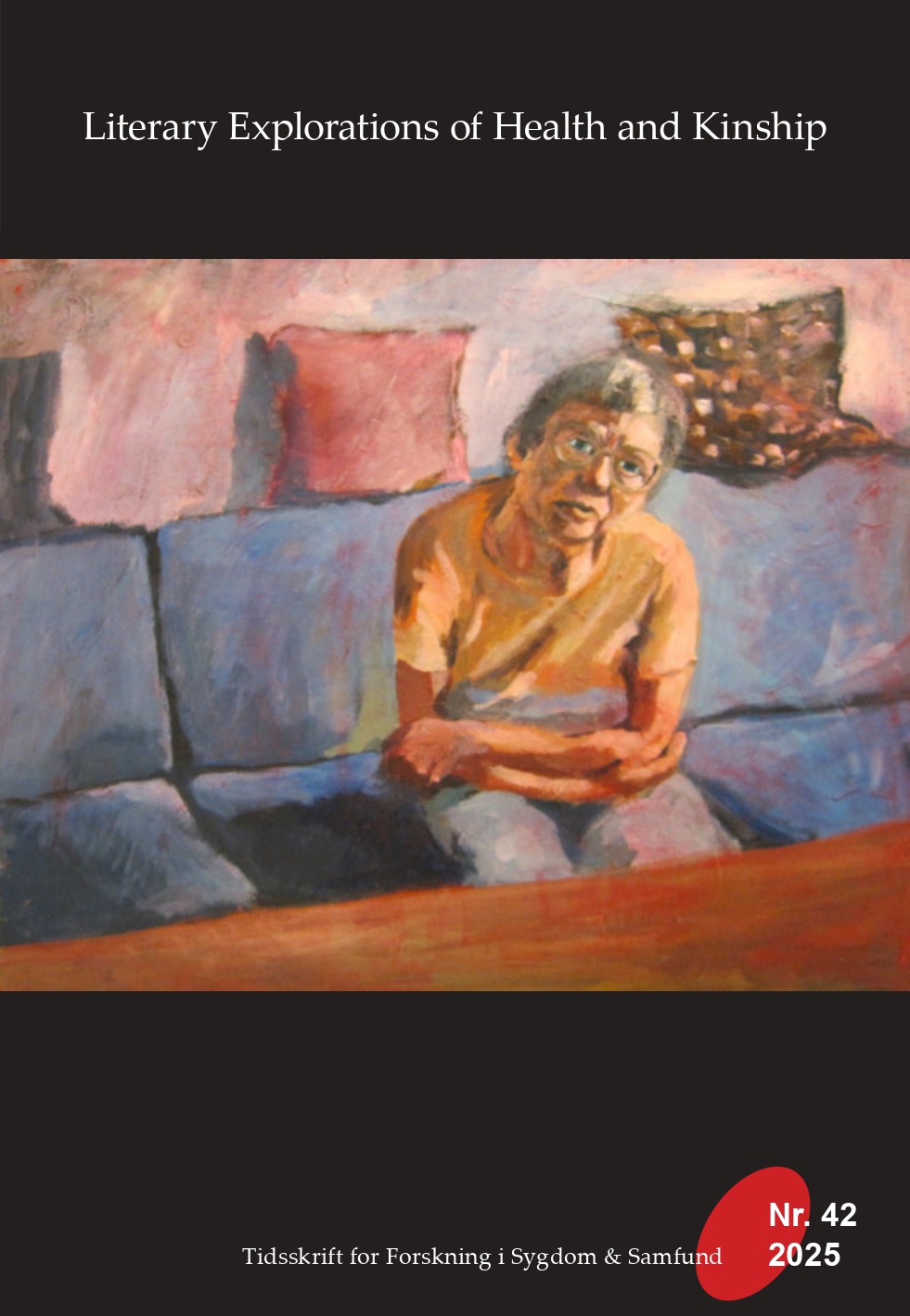Publiceret 2025-06-05
Nøgleord
- Social work,
- discourse,
- literature
Citation/Eksport
Copyright (c) 2025 Cecilie Ellefsen

Dette værk er under følgende licens Creative Commons Navngivelse –Ikke-kommerciel (by-nc).
Resumé
The article explores how a work of fiction can contribute to a social work reflection on the helping process and the challenging task of seeing the Other. The article has an interdisciplinary purpose and aims at creating a dialogue between social work discourse and the language of fiction. Drawing on Moi, Felski and Tygstrup & Holm, an argument is made that narratives, language and ethics are intertwined and to some extent transcend boundaries between literature and social work discourse. The novel analyzed is Tung tids tale (Tale of Troubled Times, my translation) by the Norwegian author Olaug Nilssen. Selected passages from the novel are interpreted through a psychological as well as a systemic perspective, highlighting the importance of language and theoretical lenses for social work ethics. The concept of institutional identities is suggested as the most fruitful approach, attributing the professionals’ conduct in the novel to systemic factors.
Referencer
- Askeland, G. (2006). Kritisk reflekterende- mer enn å kritisere og reflektere. Nordisk sosialt arbeid, Vol.2:2, pp.123-135. https://doi.org/10.18261/ISSN1504-3037-2006-02-04
- Berg, B., Ellingsen, I.T., Levin, I., Kleppe, L.C. (2015). Hva er sosialt arbeid? I: Ellingsen, I.T, Levin, I., Berg, B., Kleppe, L.C. Sosialt arbeid. En grunnbok. Oslo: Universitetsforlaget
- Borch, C. (2011). Niklas Luhmann. Abingdon, Oxon: Routledge
- Brochmann, O., Garrett, M.G. (2022)). «People are responsible for their own individual actions: dominant ideologies within the Neoliberal Institutionalised Social Work Order. European Journal of Social Work, 25 (5), 880-893. doi: https://doi.org/10.1080/13691457.2022.2040443
- Chambon, A. (2013). Recognizing the Other, understanding the Other: a brief history of social work and Otherness. Nordic Social Work Research 3:2, 120-129. doi: https://doi.org/10.1080/2156857X.2013.835137
- DeFalco, A. (2016). Imagining care: Responsibility, Dependency, and Canadian literature. Toronto: University of Toronto Press
- Degen, J.L., Kleeberg Niepage, A., Bal, P.M (2022). Lost in Context? Critical Perspectives on Individualization. Hu Arenas 2022 Jun 15:1-6.
- Douglas, M. (1986). How institutions think. New York: Syracuse University Press
- Ellingsen, I.T., Levin, I. (2015). Det sosiale i sosialt arbeid. I: Ellingsen, I.T, Levin, I., Berg, B., Kleppe, L.C. Sosialt arbeid. En grunnbok. Oslo: Universitetsforlaget
- Fellesorganisasjonen. Website. 2022. Se filmer: Sosialarbeiderne er hjertet i velferdsstaten - FO - Din fagforening
- Felski, R. (2008). Uses of Literature. Oxford, UK: Blackwell Publishing
- Fineman, M.A. (2008). The Vulnerable Subject: Anchoring Equality in the Human Condition. Yale Journal of Law & Feminism, Vol 20, No.1, 2008. Available at SSRN: https://ssrn.com/abstract=1131407
- Fontene. Website. Brageprisen til Olaug Nilssen. 2017: Brageprisen til Olaug Nilssen | Fontene.no
- International federation of social workers (2014). Global definition of social work. https://doi.org/10.18261/ISSN1504-3037-2006-02-04
- Järvinen, M. & Mik-Meyer N. (2003) (red.) At skape en klient. Institusjonelle identiteter i socialt arbejde. København: Hans Reitzels Forlag
- Julkunen, I., Rauhala, P. (2013). Otherness, social welfare and social work-a Nordic perspective. Nordic Social Work Research. https://doi.org/10.1080/2156857X.2013.834266
- Kleppe, L.C. (2015). Kunnskaps i sosialt arbeid. I: Ellingsen, I.T, Levin, I., Berg, B., Kleppe, L.C. (red.), Sosialt arbeid. En grunnbok. Oslo: Universitetsforlaget
- Kleppe, L.C. (2016). Helhetssyn – hva så? -Et honnørord med uklar betydning for profesjonell praksis i helse - og velferdsforskningen. Tidsskrift for omsorgsforskning, Vol 2, No 3:252-259. https://doi.org/10.18261/issn.2387-5984-2016-03-11
- Levin, I. (2004). Hva er sosialt arbeid. Oslo: Universitetsforlaget
- Levin, I. (2015). Sosialt arbeid som spenningsfelt. I: Ellingsen, I.T, Levin, I., Berg, B., Kleppe, L.C. (red.), Sosialt arbeid. En grunnbok. Oslo: Universitetsforlaget
- Nesby, L. (2021). Skjønne og stygge sykdomsskildringer. Scandinavian University Press, 61-102. doi: https://doi.org/10.18261/9788215045122-2021-02
- Nilssen, O. (2017). Tung tids tale. Oslo: Det Norske Samlaget
- Prochaska, J.O & DiClemente, C.C. (1982). Transtheoretical therapy. Toward a more integrative model of change. Psychotherapy: Theory, research and practice, 19 (3): 276-288. https://psycnet.apa.org/doi/10.1037/h0088437
- Reupert, A., Straussner, S.L., Weimand, B., Maybery, D. (2022) It takes a village to raise a child. Understanding and expanding the concept of the “Village”. Front. Public Health, Vol 10:756066. https://doi.org/10.3389/fpubh.2022.756066
- Shulman, L. (2003). Kunsten å hjelpe individer og familier. Oslo: Gyldendal Akademisk
- Simonhjell, N. (2020). Å fortelje eller bli fortald. Ein analyse av Olaug Nilssens Tung tids tale (2017). In: Lid, I.M., Solevåg, A.B. Religiøst medborgerskap. Oslo: Cappelen Damm Akademisk, doi:10.23865/noasp.100.ch8
- Skjervheim, H. (1999). Deltakar og tilskodar og andre essays. Oslo: Aschehoug
- Sæther, K. (2022). Når forskningskulturer møtes: Noen prinsipielle avklaringer av interdisiplinær forskning. I: Kleive, H.V., Lillebø, J.G., Sæther, K. (red.), Møter og mangfold. Religion og kultur i historie, samtid og skole. http://doi.org/10.23865/noasp.156
- Tøssebro, T & Wendelborg, C. (2018). Idealer og realiteter- perspektiv og eksempel fra forskning om funksjonshemming. I: Berg, B., Haugen, G. M. D., Elvegård, K., Kermit, K. (red.) Marginalitet, sårbarhet, mestring. Metodiske utfordringer i praksisnær forskning. Oslo: Universitetsforlaget
- Warberg, S.H. (2021). Apostrofere den levende. Den pårørendes vitnemål om autisme i Olaug Nilssens Tung tids tale. K&K: Kultur og Klasse. Vol.49 (131: Sygdom),59-80. https://doi.org/10.7146/kok.v49i131.127483

